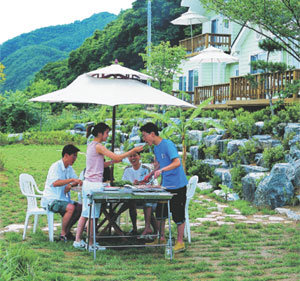A Cozy Respite in Natures Bosom
A Cozy Respite in Natures Bosom
Posted July. 07, 2004 22:19,

This summer, try a vacation at a pension.
The no. 1 advantage cited by vacationers who have stayed at a pension is its close proximity to nature: most pensions are adjacent to mountains, rivers, the sea, or green belts. On the other hand, a lot of them are pensions in name only: many lack such modern facilities as air conditioning and private bathrooms, or are simply renovated minbak houses (low-end home-stay establishments).
Lee Hak-sun, representative of Lets Go Lodge, advises prospective pensioners to ascertain location, size, and amenities on the internet or elsewhere before making a reservation. Lets go over the check points for a successful pension stay.
Reservations?
Most pensions have their own homepage, allowing prospective vacationers to make reservations online. Find out if there are places nearby for your desired leisure activities, like forest showers, rafting, biking, hiking, fresh-water fishing, sea bathing, and mountain-climbing. Ask if they provide pick-up services between the pension and local train stations or nearby resorts. Inquire whether or not they serve breakfast.
Sometimes, online photographs of surrounding landscapes and pension facilities are edited from outside material; make sure that the picture you see on the website is actually of the establishment being advertised. Bulletin boards at the pension websites are good for obtaining accurate assessments of the environment provided by a particular establishment.
Accommodations often cost around 100,000 won per night for a four-person party. Pensions with a view of the mountains or the sea can be slightly more expensive, by about 20,000 to 30,000 won. Rooms have a set standard capacity, so parties that exceed this number are charged 10,000 won per extra person. For instance, if a 10-pyeong accommodation with a standard capacity of two and a maximum capacity of four costs 100,000 won per night, and your party consists of four persons, you would pay 120,000 won for a one-night stay.
Useful Knowledge
Unlike rental apartments (or condos in Korea), which include common areas in the overall floor space, pensions go by the actual number of pyeongs, making it unnecessary to insist on larger floor space. A 10-pyeong pension is comparable to an 18-pyeong condo or apartment, and is ideal for a three-person family that includes an infant. Depending on the existence of a separate balcony or a yard, the overall space can feel even larger.
The majority of pensions provide a spacious yard where you can use charcoal and barbecue grills for a small fee of around 10,000 won. However, they do not provide food for outdoor cooking, so its convenient to purchase meats, vegetables, and other side dishes at a discount grocery store.
Amenities and appliances differ drastically from pension to pension, so its a good idea to ask about them in advance. In particular, checking for kitchen wares--such as refrigerators, electric rice-cookers, pots and pans, and utensils--is a must. Before leaving the pension, lodgers are required to divide up their trash into recyclables, food waste, and regular trash.
In-Jik Cho cij1999@donga.com





![트럼프의 그린란드 병합 의지, ‘이 사람’이 불씨 지폈다[지금, 이 사람]](https://dimg.donga.com/c/138/175/90/1/wps/NEWS/IMAGE/2026/01/20/133193287.1.jpg)

